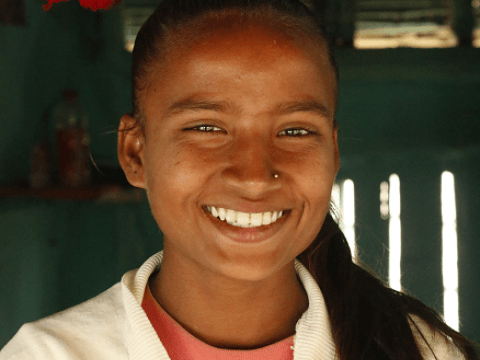The world through Saloni's eyes

Saloni loves to read. Nepali has always been her favourite subject as she is fond of reading Nepali poems.
She lives in Sarlahi district which is very close to the Nepal-India border in the Southern Nepal. She is a middle child of her parents. The past six years of life have not been easy for her.
When she was seven years of age, her studies did not advance smoothly as her eyes began developing a defect that remained untreated for years. “While studying or watching TV, my eyes used to be filled with tears, and I also endured pain in my head. Tears rolled down my eyes when I stared at anything for even a short time”, Saloni recalled. Encountering these problems led her to face difficulty while reading or writing, which affected her performance at school. The thought of having to stay home while her peers went to school scared her.
When Saloni shared with her mother Rita what she was going through, Rita did not express much concern. “I assumed this was happening to her because she was watching television a lot. I even removed the television screen from our home due to this reason. Assuming the problem would be treated on its own, I did not think it would require major attention. Because the household chores and farming kept me busy, I could not accompany my daughter to see a doctor,” her mother admitted.
On the other hand, teachers from Saloni’s school were oblivious to her eye problem. Although she had informed her close friends about it, they did not think of it as something that would require the teacher’s attention. Sanjay, who has been teaching Saloni for two years in the same school agreed that he was unaware of her problem then. “Since there are many students in the classroom, it is not possible to know if a student had been facing such a problem. Had we known before, we would have done something about it,” Sanjay shared.
Through Strengthening Inclusive Education in Nepal (SIKAI) project, when a screening was conducted in Saloni’s school to identify functional limitations among students, she got her eyes tested and the problem was identified. She was referred for further examination where she was prescribed to wear glasses to correct her eye power. The doctor attending the medical camp also recommended to keep washing her eyes with clean water regularly and consuming nutritious food. Lack of vitamins in her regular diet, improper hygiene and air pollution were considered to be the causes of the problem in Saloni’s eyes.
Saloni was provided with a pair of eyeglasses (an assistive device) by a mobile teacher whose primary role is to ensure the enrollment of children with disabilities and reading difficulties to school. Saloni and her parents were also instructed on the proper use of the glasses. The mobile teacher visited Saloni every month to monitor the improvement of her eyesight.
With the glasses on, Saloni is now able to continue her passion for reading books and actively participates in the classroom activities as well. Through the parental training provided by the project, Rita is aware of the importance of nutritious food to everyone in the family. She is also conscious to ensure that her children maintain personal hygiene. Expressing her happiness, Rita exclaimed, “What the project did for my daughter was something I was unable to do for so long.”
After a year of lifestyle changes and with an assistive device, Saloni’s eyes are cured! Post the re-assessment, she does not face any problems with reading or writing.
"I feel so happy, I can see everything now without any discomfort. I do not need to wear glasses anymore to read the things that I love,” she expressed with joy while her eyes sparkled.
Inclusive education for children in basic education is critical to build an educated community. The SIKAI project aims to create a better world for our children where quality and accessible education paves the way for excellence. It focuses on improving education access, participation, and achievement for children in and out of school, with a specific focus on addressing inequalities related to caste, disability, ethnicity, religion, and gender.